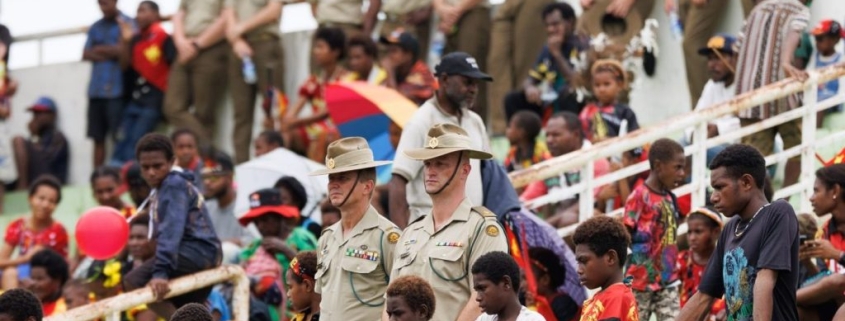It’s time for the ADF to train in Asia-Pacific languages
The proposed negotiation of an Australia–Papua New Guinea defence treaty will falter unless the Australian Defence Force embraces cultural intelligence and starts being more strategic with teaching languages—starting with Tok Pisin, the most widely spoken language in PNG.
More generally, the ADF needs a language training program focused on its region, shifting from an outdated focus on Middle Eastern languages. Linguistic interoperability and cross-cultural intelligence are necessary for building a trusted, sustainable partnership in the region.
By realigning its language priorities, the ADF can maximise operational effectiveness with minimal investment. At this stage, there is very little known about the defence treaty, outside of its proposed negotiations. Noting PNG’s geographic proximity to Australia, a defined defence treaty is overdue.
Yet despite their historical ties and close geographic proximity, Australia and PNG have a complex and, at times, fragile relationship. From colonial legacies to contemporary frictions over aid, security interventions, and the conduct of ADF personnel, trust cannot be assumed.
For defence cooperation to succeed, Australia must do more than rely on formal agreements or institutional goodwill. True partnership requires social license—genuine, earned trust between military forces, governments and local communities. Language and cultural fluency are fundamental for building that trust.
One of the greatest obstacles to effective Australian military engagement is language training. For two decades, the ADF has prioritised such Middle Eastern languages as Arabic, Urdu, Pashto and Farsi, reflecting what is now a former operational focus. Australia’s strategic priorities have shifted to the Indo-Pacific, so its military language training should, too.
Even harder to justify is continued ADF training in the languages of European countries whose armed forces play a small role on this side of the world and, in any case, use English as a NATO standard.
PNG presents a particularly challenging linguistic environment, with over 840 living languages. But Tok Pisin is a practical choice. As an English-based creole, it is fairly easy to learn for ADF troops and is useful in military, governmental and community settings.
Bahasa, in either its Malay or Indonesian form, should also be considered for wider ADF language training. Though distinct, the two branches of the language are mutually intelligible, enabling communication with around 300 million of Australia’s neighbours across Indonesia and Malaysia. It is a cost-efficient option that is highly relevant to contemporary ADF operations.
Linguistic interoperability alone is not enough; it must be paired with deep cultural understanding. Effective military cooperation is not just about tactics and technology; it is about people. To foster lasting partnerships, ADF personnel must be able to engage with counterparts from neighbouring countries on their terms, understanding local norms, social structures and historical sensitivities.
Missteps in communication and behaviour can rapidly erode trust. Historical examples support the importance of linguistic interoperability: In my role at the Australian War Memorial, I have been reviewing operational benefits of deeper cultural intelligence between British officers and Pacific island troops in World War II. Without cultural fluency, Australia risks being seen as an external force imposing its own agenda, rather than a genuine partner committed to PNG’s sovereignty and security.
The success of the Australia–PNG defence treaty will not be determined by the text of the agreement alone. It will be measured by the strength of relationships built on the ground. To ensure this partnership is meaningful, Australia must move beyond generic regional engagement strategies and make a deliberate investment in linguistic and cultural capability.
The first step in revising ADF language training is clear: Tok Pisin must move to the centre. If funding allows, Bahasa makes sense as a second-order line of effort.
In international military deployments, every word matters, every cultural nuance shapes perception, and every action either builds or erodes trust. If Australia is serious about its commitment to its neighbours, especially PNG, it must invest in linguistic and cultural capabilities.



